-

新人教版高中英语必修2Unit 3 The Internet-Listening &Speaking&Talking教案二
From the pictures in the text and the title--- choose the best app, we can know that this part is about how to save money by using apps.Step 2 While-listening1. Laura and Xiao Bo are talking about apps. Listen to their conversation and find out what apps they want.Xiao Bo is looking for a(n) exercise app to help him get in shape.Laura would like an app for getting rich and another that will make her grades better.2. Listen again. Are the sentences true T or false F?1). Both of Xiao Bo's apps keep track of the steps he takes._____2). Xiao Bo's second app can help him make a fitness plan._____3). Laura needs an app that will help her get discounts.______4). Laura needs an app that will add money to her bank account._______F T F T3. Listen once more and tick the sentence you hear. Underline the words used to express predictions, guesses, and beliefs.Predictions, Guesses, and Beliefs________It might help me walk more.________My guess is that it wouldn't work.________I imagine this app would help me get fit faster________I suppose that would be good.________I guess you could save a little with this app.________I suppose there would be some problems, too.________I believe this app could help me get thinner.

新人教版高中英语必修2Unit 4 History and Traditions-Discovering Useful Structure教案一
Step 5 Practice一、完成下列句子。1. Judy and I _______________(把车停下来(park))in an underground car Park near Trafalgar Square, where we could ______________________(让我们的车充电(charge)).2. When we finally reached the service desk to ask for audio guides, we heard it ___________ that there were no audio guides____________(留下,剩下).3. We__________________________(发现自己对...很惊讶)the large number of visitors and the amount of noise at the entrance of the National Gallery.4. Judy ____________________(眼神专注于) Van Gogh’s Sunflowers. It was hard to approach the painting as there were so many people around.5. She ____________________(把这幅画的复制品装箱(box)) to ensure that it was delivered safely.答案:1.had our car parked get our car battery charged 2. announced left 3. found ourselves very surprised 4. had her eyes fixed on 5. had a copy of the painting boxed二、用过去分词对下列句子进行改写。1. Loch Ness was surrounded by beautiful natural landscape, which made it look amazing.2. Carl and his friend stayed with a generous family who offered them bread with butter and honey that was homemade.3. The family’s ancestors once attended to soldiers who were wounded in the First World War.4. The young people were attracted by the legend of Loch Ness. They watched over the lake with their cameras and binoculars, which were positioned on the hill.答案:1. Loch Ness surrounded by beautiful natural landscape looks amazing.2. Carl and his friends stayed with a generous family who offered them homemade bread with butter and honey.3. The family’s ancestors once attended to wounded soldiers in the First World War.4. The young people attracted by the legend of Loch Ness watched over the lake with their cameras and binoculars positioned on the hill.

新人教版高中英语必修2Unit 3 The Internet-Reading for Writing教案二
8. However, the more polite you are, the less likely it is you will be attacked. 然而, 你越有礼貌, 你被攻击的可能性就越小。 Step 8 Writing---the articleHow to stay safe in the online chat roomToday I thought I’d blog about a question that has been asked many times--- how do you stay safe online and avoid bad experiences in the online chat room ? I’m not an expert, but many years as a blogger have taught me a thing or two.First of all, there’s the golden rule of the Internet: keep out of what makes you uneasy. Don’t post comments or click on anything. Second, protect your privacy. Don’t give out too much private information like your address, phone numbers, the ID numbers, etc. Third, be polite. If you are polite to others on the Internet, you won’t be attacked in normal situation. Finally, don’t believe in others easily and never meet someone you met online alone. It is very dangerous.Have you had any bad experiences online, or do you have some good advice for staying safe? Post your comments below!Step 9 Pair workExchange drafts with a partner. Use this checklist to help your partner revise his/her draft.1. Does the writer tell the reader what he/she know about the topic ?2. Are the tips and suggestions well organised ?3. Has the writer defined the new words ?4. Does the author include examples, comparison, or explanations ?5. Does the writer end by asking readers to leave comments and/or suggestions ?6. Can you find any grammar or spelling mistakes.Step 6 HomeworkPut up your revised draft in the classroom or read it to your class.

新人教版高中英语必修2Unit 4 History and Traditions-Reading and Thinking教案二
Step 5 While reading---Task 3Read the text again and answer the following questions.Q1: How many countries does the UK consist of ?4 Q2: What are the four countries of the United Kingdom?England, Wales, Scotland and Northern Ireland Q3: Which two were the first to be joined together ?England and WalesQ4: What are the two chief advantages of studying the history of a country ?The first one is to help you understand more about the country and its traditions.The second one is to make visiting it more enjoyable.Q5: What’s the author’s attitude towards studying the history ?Supportive/positiveStep 6 Post reading---Retell the textThe United Kingdom, Great Britain, Britain, England—many people are confused by (1)_____ these different names mean. In the 16th century, the nearby country of Wales (2) __________(join) to the Kingdom of England. In the 19 th century, the Kingdom of Ireland was added to create the United Kingdom of Great Britain and Ireland. Finally, the southern part of Ireland (3) ______ (break) away from the UK, which resulted in the full name we have today. However, most people just use the (4)_________(shorten) name: the UK. The four countries (5)__________ belong to the United Kingdom work together in some areas. There were four sets of invaders and the last group were the Normans. They had castles (6)_________(build) all around England and made changes (7)__________ the legal system. Studying the history of the country will make your visit much more (8)_________(enjoy). The capital city London is (9)___ ancient port city that has a history (10)______(date) back to Roman times. 1. what 2.was joined 3.broke 4.shortened 5.that 6. built 7.to 8.enjoyable 9.an 10.dating Step 6 Homework

新人教版高中英语必修2Unit 4 History and Traditions-Reading for Writing教案
Step 1 Lead inThere are many interest of places in the UK. What do you know ?The Big Ben the London Tower the Thames RiverStep 2 Before reading---analyze the titleBeautiful Ireland and its traditionWe know that the article mainly tells about the beauty and traditions of Ireland. Step 3 While reading---Task 1Read the text and answer the following questions.Q1: What makes the Irish countryside exciting and inspiring?Its beauty and how it offers something for all the scenes.Q2: What are the best ways to experience some Irish traditions and cultures?By stopping by a village pub and relaxing with a drink and traditional meal while listening to music and watching dancingQ3: What is the meaning of “breathe in the sweet scent of fresh flowers while birds greet the new day with their morning song ?”It means to not just smell but also breathe in the smell of fresh flowers early in the morning as the birds sing their first song of the new day.Q4: What are the best ways to experience Chinese traditions and customs ?By travelling to different places and using all your senses to experience everything and by interacting with local people.Step 4 While reading---Task 2Analyze the descriptive paragraph1. Identify and underline the paragraph’s introductory sentence and the ending sentence.Introductory sentence: Ireland’s beautiful countryside has always had a great influence on its people and traditions.Ending sentence: And if you introduce yourself to a friendly face, you are more than likely to experience local culture and customs first-hand.2. The paragraph talks about different senses in different places. Write the senses and places in the order that they appear.

新人教版高中英语必修2Unit 5 Music-Listening&Speaking&Talking教案
choir memberspeople to run food stands people to sell festival ticketspeople to sell music CDspeople to set up equipmentmusical performersStep 2: Listen to the announcement again and answer the questions. ? 1. What kind of songs will Grace Davis sing at the festival?? 2. Who can try out as a performer?? 3. What can those who think they do not have musical talent do?? 4. How can students volunteer to take part?? Talking about preferences:? Would you prefer doing ..?? What would you prefer to do?? Would you rather do .... or ….?? What would you rather do?? I'd prefer .... to ..? I'd rather have ... than .. Step 3: Speaking ProjectWork in groups. Role-play the conversation or make a new one.? Debbie: Where have you been? You missed the announcement about the music festival.? John: I was at the doctor's office. Music festival?? Frank: Yes, it's going to be next month on the school sports field. John, you can play the piano. How about playing it at the festival?? John: Well, I'd rather play the violin. I can play Liang Zhu.? Frank: Wow! Sounds good. What about you, Debbie? ? Debbie: Actually, I don't have much musical ability. I'd prefer just to help out with the crowds.? Frank: You can sell tickets or work at a food stand.? John: So can I assume that the aim of the festival is to raise money?? Debbie: Yes. All of the money will go to charity.

新人教版高中英语必修2Unit 5 Music-Reading and Thinking教案二
1. Get basic information about Eric; read deeply to understand the history and development of the virtual choir.2. Understand what the function of the virtual choir is and how to make a virtual choir.3. Understand the meaning of some languages in the context of the text through question guidance, such as “Many people do not have close friends or contacts who have the same interest in music.” and so on.Step 1 Leading-in1. Answer the following questions.Q1:Do you know the Apps like Tik Tok and Quick Hand?Q2: Do you want to make a Tik Tok video or a Quick Hand video?2. Play a Tik Tok video Step 2: Understanding the title Q1:What does the title mean ?Q2: Is the article a narration or exposition? Why? Q3: Can you change the title ? If you can, what is the title?Step 3: Scanning the whole text and getting the basic information1. Answer the following questions.Q1:Who came up with the idea for a virtual choir?Q2: Where did Eric studied the musical composition?Q3: What is his song?2. Find the main idea of each paragraph3. Deal with some new words.Step 4: Reading carefully to get detailed informationPara 1 How to make a virtual choir1. PreparationA. tools: a virtual camera; an Internet connectionB. hero/heroin: friends or some individuals who have the same interests2. Process
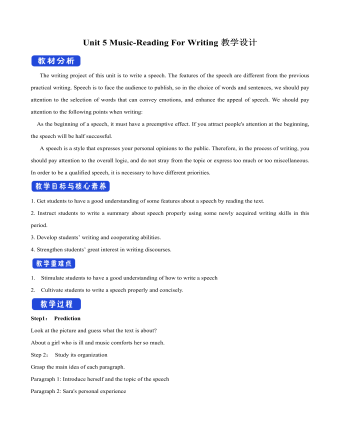
新人教版高中英语必修2Unit 5 Music-Reading For Writing教案一
(4)Now we have heard a number of outstanding speeches ... 我们已经聆听了许多精彩的发言……(5)Because we wanted the nations of the world, working together, to deal with ... 因为我们希望全世界各国团结起来去应对……(6)And if we do not act ... 如果我们不采取行动……(7)Now, I share the concerns that have been expressed ... 我也同意对于……表达的担心(8)Let us show the world that by working together we can ... 让我们告诉全世界,通过一起努力我们可以……(9)It is now time for us to ... 是时候我们……(10)And I have always wished that ... 我一直希望……(11)Thank you for letting me share this day with me.感谢你们和我共度这一天。实践演练:假如你是高中生李华,你校将举办一次以“音乐”为主题的演讲比赛,请你按照主题,写下你的演讲稿。注意:词数100左右。First of all, thank you for listening to my speech. My topic is: love music like love yourself.Music is like the air we need to maintain our normal lives around us. You can't imagine how terrible a world without music would be. Movies and TV shows have no music, only dry conversations and scenes; mobile phones only vibrations; streets only noisy crowds; cafes, western restaurants only depressed meals. What a terrible world it is!As a student, I hope we all can enjoy the fun brought by music in our spare time. Instead of just listening to music, we can even make our own music. Let's enjoy the fun of music!Thanks again for your attention!
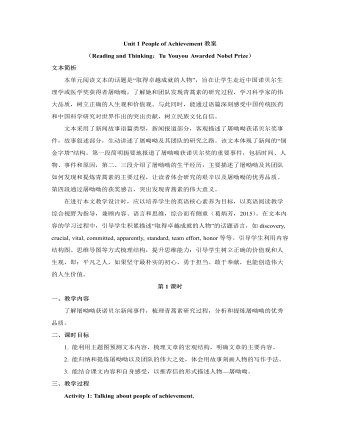
新人教版高中英语选修1Unit 1 People of Achievement教案
【设计意图】 基于上述分析,学生总结新闻故事语篇类型的特征,即标题的省略性、导语的概括性、数据的支撑性和引语的重要性。在此过程中,学生对新闻故事语篇类型有了更深层次的了解,对于学生阅读和写作具有重要意义。Activity 7: Discussing to make a writing outline.本活动为实现课时目标3。1.Discuss and make an outline.Ask students to discuss in groups of four and make their own writing outline.To celebrate the 70th anniversary of the People’s Republic of China, our school newspaper starts a new column about “People of Achievement”. You plan to write a news story about one of the winners of the Medal of the Republic in 2019, including Yu Min, Shen Jilan, Sun Jiadong, Li Yannian, Zhang Fuqing, Yuan Longping, Huang Xuhua and Tu Youyou.【设计意图】 教师创设情境,即为庆祝新中国成立70周年,校报新增有关卓有成就人物的栏目,你将从共和国勋章获得者中,选择一位写一篇新闻故事,向该栏目投稿。学生以小组合作形式,展开讨论,并写出新闻故事框架,有助于学生课后收集人物信息,撰写新闻故事。
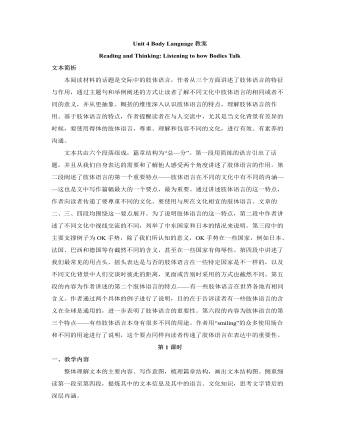
新人教版高中英语选修1Unit 4 Body Language教案
本阅读材料的话题是交际中的肢体语言,作者从三个方面讲述了肢体语言的特征与作用,通过主题句和举例阐述的方式让读者了解不同文化中肢体语言的相同或者不同的意义,并从更抽象、概括的维度深入认识肢体语言的特点,理解肢体语言的作用。基于肢体语言的特点,作者提醒读者在与人交流中,尤其是当文化背景有差异的时候,要使用得体的肢体语言,尊重、理解和包容不同的文化,进行有效、有素养的沟通。文本共由六个段落组成,篇章结构为“总—分”。第一段用简练的语言引出了话题,并且从我们自身表达的需要和了解他人感受两个角度讲述了肢体语言的作用。第二段阐述了肢体语言的第一个重要特点——肢体语言在不同的文化中有不同的内涵——这也是文中写作篇幅最大的一个要点,最为重要。通过讲述肢体语言的这一特点,作者向读者传递了要尊重不同的文化、要使用与所在文化相宜的肢体语言。
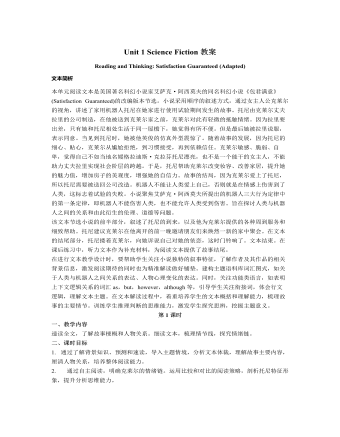
新人教版高中英语选修4Unit 1 Science Fiction教案
本活动旨在落实课时教学目标2。 1.Think, discuss and share. Students form groups of 4, discuss about the given ending make comments. Q1: Do you like the ending? Q2: Was it a logical ending? Why so or why not? [设计意图]通过引导学生思考、讨论、评价,比较个人、同伴所预测的结局和听力文本所给定的结局的异同点,深化对文本的认知,发展学生的评判性思维能力。 Activity 4: Exploring Asimov’s three laws of robotics and the purpose of the writing 本活动旨在落实课时教学目标3。 1. Get to know Isaac Asimov’s three laws of robotics. The teacher shares Isaac Asimov’s three laws of robotics. The three laws state that: ①A robot may not injure a human being or, through inaction, allow a human being to come to harm. ②A robot must obey any orders given to it by human beings, except where such orders would conflict with the First Law. ③A robot must protect its own existence as long as such protection does not conflict with the First or Second Law. Q: How does Tony’s story relate to the laws? 2. Figure out Isaac Asimov’s purpose of writing Satisfaction Guaranteed. The students express their opinions about the author’s writing purpose. Q: Why did Isaac Asimov write such a story? S: To explore the relationship between robots and humans. [设计意图]通过了解艾萨克·阿西莫夫所制定的机器人三大定律,加深学生对文本的理解,深入探究文本的主题意义。推理作者的写作目的,联系生活实际,思考人类与机器人的关系。
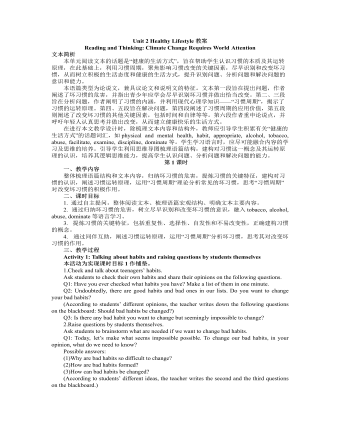
新人教版高中英语选修3Unit 2 Healthy Lifestyle教案
Activity 4: Figuring out the structure and the writing purpose 本活动为实现课时目标2。 1.Read Paragraph 6 and think about its main idea and the writer’s writing purpose. Q1: If you were the author, how would you end your article? “For young people, there is plenty of time to change bad habits. However, there is no “magic pill” or delete button that will help you; you have to think about your bad habits and decide on some changes. You have the power to build a happy and healthy life full of good habits!” Q2: What is Paragraph 6 mainly about? (Possible answer: to appeal to young people including teenagers to change bad habits and live a happy and healthy life.) 2.Think about the writer’s writing purpose and share opinions. Q1: What is the writing purpose? Work in pairs and figure it out. (Possible answer: On the one hand, the passage is written to help teenagers change their bad habits and live a healthy lifestyle. On the other hand, it provides us with a scientific way to identify and analyse our problems objectively, thus strengthening our resolve to tackle the seemingly common yet tough problems in our lives.) 【设计意图】 步骤1旨在预测和验证文章最后一段主要内容,梳理完整的语篇结构,步骤2旨在思考和讨论作者的写作目的。教师也可根据学生课堂反应情况融入对语篇人称多次转换的思考。
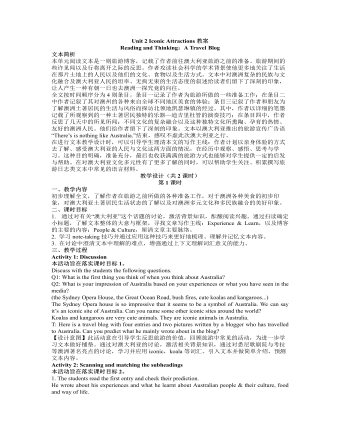
新人教版高中英语选修4Unit 2 Iconic Attractions教案
帮助学生通过讨论与对主题的提升,反思自己的旅游方式,以便做出更优化的安排,在今后的旅程中有更多的收益。 Activity 2: Further discussion of the 6 elements above and supplement of more background knowledge 本活动为实现课时教学目标2。 1.Target Q: The writer’s clear target of traveling, meeting the people and experiencing the culture, is closely related to his major in social studies. Then what is social studies? Social studies is a part of a school or college curriculum concerned with the study of social relationships and the functioning of society and usually made up of courses in history, government, economics, civics, sociology, geography, and anthropology. (Dictionary by Merriam-Webster) Reflection: When you go out to travel, what targets do you usually have in mind? 2.Research Q: Suppose you are traveling to Hangzhou during the school holidays, how will you do research on the city? (surf the internet, read books or travel brochures, consult friends, ...) What information will you be interested to know? (location, iconic sites, local cuisines, interesting customs, shopping malls ...) 3.Abandonment To make the most of time, we have to learn to abandon so that we can accomplish our plan. What will you be interested in doing if you go to Hangzhou if you have a week’s time? What if you only have 2 days? 4~5. Venturing & Experiencing Q: What did he venture to do during the trip? What new experiences did he have? In Sydney: attend his first open-air barbecue, enjoy many different but yummy meals In Catherine: observe the life and customs of the aborigines appreciate their music & try the musical instruments: the didgeridoo
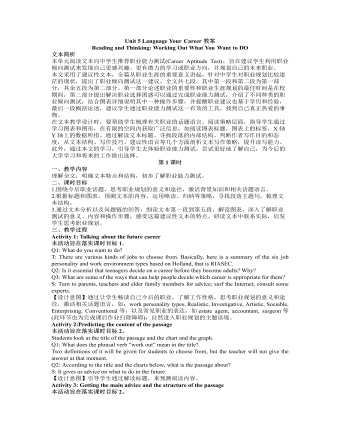
新人教版高中英语选修4Unit 5 Language Your Career教案
本单元阅读文本向中学生推荐职业能力测试(Career Aptitude Test),旨在建议学生利用职业倾向测试来发现自己更感兴趣、更有潜力的学习或职业方向,并规划自己的未来职业。 本文采用了建议性文本,全篇从职业生涯的重要意义讲起,针对中学生对职业规划比较迷茫的现状,提出了职业倾向测试这一建议。全文共七段,其中第一段和第二段为第一部分,其余五段为第二部分。第一部分论述职业的重要性和职业生涯规划的最佳时间是在校期间,第二部分提出解决职业选择困惑可以通过完成职业能力测试,介绍了不同种类的职业倾向测试,结合图表详细说明其中一种操作步骤,并提醒职业建议也基于学历和经验,最后一段概括论述,建议学生通过职业能力测试这一有效的工具,找到自己真正热爱的事物。 在文本教学设计时,要帮助学生梳理有关职业的话题语言。阅读策略层面,指导学生通过学习图表和图形,在有限的空间内获取广泛信息,如阅读图表标题,图表上的标签,X轴Y轴上的数据所指。
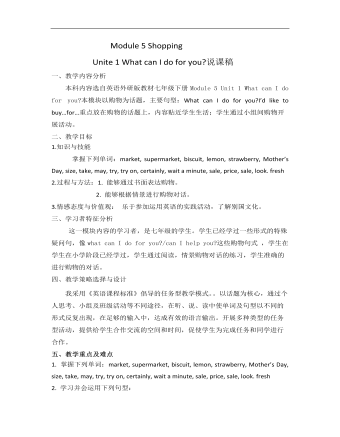
初中英语外研版七年级下册《Module 5 Shopping》说课稿
二、教学目标1.知识与技能掌握下列单词:market, supermarket,biscuit, lemon, strawberry, Mother’s Day, size, take, may, try, try on,certainly, wait a minute, sale, price, sale, look. fresh2.过程与方法:1. 能够通过书面表达购物。2. 能够根据情景进行购物对话。3.情感态度与价值观:乐于参加运用英语的实践活动,了解别国文化。
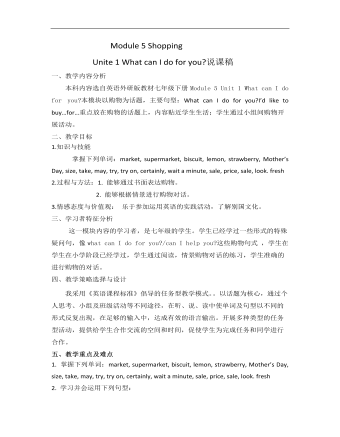
初中英语外研版七年级下册《Module 5 Shopping》说课稿
二、教学目标1.知识与技能掌握下列单词:market, supermarket,biscuit, lemon, strawberry, Mother’s Day, size, take, may, try, try on,certainly, wait a minute, sale, price, sale, look. fresh2.过程与方法:1. 能够通过书面表达购物。2. 能够根据情景进行购物对话。3.情感态度与价值观:乐于参加运用英语的实践活动,了解别国文化。三、学习者特征分析这一模块内容的学习者,是七年级的学生。学生已经学过一些形式的特殊疑问句,像what can I do for you?/can I help you?这些购物句式 ,学生在学生在小学阶段已经学过,学生通过阅读,情景购物对话的练习,学生准确的进行购物的对话。
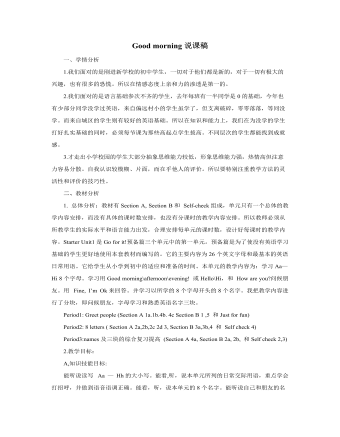
人教版新目标初中英语七年级上册Good morning说课稿
1.课堂活动中的竞赛制:以记奖评优的形式无声的评价每一个活动,包括个体和小群体。在第一课时评最佳演员和导演奖,第二课时评最佳团体奖,既节约时间又明确有效。使学生能提高语言质量,增强参与意识,提高学习兴趣。2. 教师课堂上语言、表情激励制:在课堂活动中教师要乐于 、善于用激励性语言。从good, super, smart, excellent , great ,wonderful等,用微笑,皱眉,摇头、点头等身体语言对于学生的评价是方便又有效的途径。3.课后作业评价:口头作业在第二天课堂上表演,接受全体同学的评价。笔头作业有教师批阅,以评语的方式出现。优秀作业予以展出或交流。积极地肯定和鼓励学生是我们评价的重要目的之一。4.单元结束后综合性评价:除了笔试以外,也可以根据学生实际开展丰富的活动,如:调查报告、小品表演、专题演讲等。
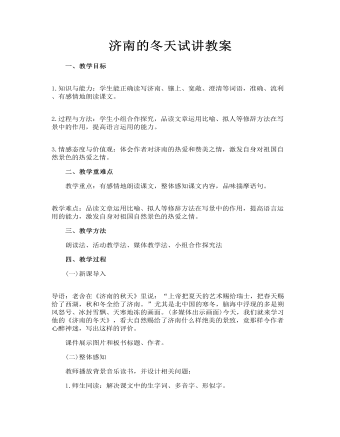
济南的冬天试讲教案
二、教学重难点 教学重点:有感情地朗读课文,整体感知课文内容,品味揣摩语句。 教学难点:品读文章运用比喻、拟人等修辞方法在写景中的作用,提高语言运用的能力,激发自身对祖国自然景色的热爱之情。 三、教学方法 朗读法、活动教学法、媒体教学法、小组合作探究法 四、教学过程 (一)新课导入 导语:老舍在《济南的秋天》里说:“上帝把夏天的艺术赐给瑞士,把春天赐给了西湖,秋和冬全给了济南。”尤其是北中国的寒冬,脑海中浮现的多是朔风怒号、冰封雪飘、天寒地冻的画面。(多媒体出示画面)今天,我们就来学习他的《济南的冬天》,看大自然赐给了济南什么样绝美的景致,竟那样令作者心醉神迷,写出这样的评价。
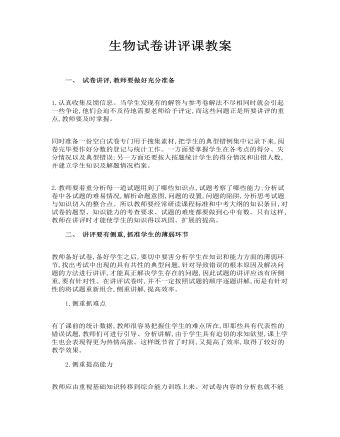
生物试卷讲评课教案
二、 讲评要有侧重,抓准学生的薄弱环节 教师备好试卷,备好学生之后,要切中要害分析学生在知识和能力方面的薄弱环节,找出考试中出现的具有共性的典型问题,针对导致错误的根本原因及解决问题的方法进行讲评,才能真正解决学生存在的问题,因此试题的讲评应该有所侧重,要有针对性。在讲评试卷时,并不一定按照试题的顺序逐题讲解,而是有针对性的将试题重新组合,侧重讲解,提高效率。 1.侧重抓难点 有了课前的统计数据,教师很容易把握住学生的难点所在,即那些具有代表性的错误试题,教师们可进行引导、分析讲解,由于学生具有迫切的求知欲望,课上学生也会表现得更为热情高涨。这样既节省了时间,又提高了效率,取得了较好的教学效果。
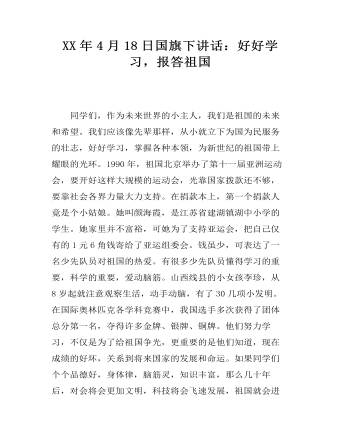
XX年4月18日国旗下讲话:好好学习,报答祖国
同学们,作为未来世界的小主人,我们是祖国的未来和希望。我们应该像先辈那样,从小就立下为国为民服务的壮志,好好学习,掌握各种本领,为新世纪的祖国带上耀眼的光环。1990年,祖国北京举办了第十一届亚洲运动会,要开好这样大规模的运动会,光靠国家拨款还不够,要靠社会各界力量大力支持。在捐款本上,第一个捐款人竟是个小姑娘。她叫颜海霞,是江苏省建湖镇湖中小学的学生。她家里并不富裕,可她为了支持亚运会,把自己仅有的1元6角钱寄给了亚运组委会。钱虽少,可表达了一名少先队员对祖国的热爱。有很多少先队员懂得学习的重要,科学的重要,爱动脑筋。山西线县的小女孩李珍,从8岁起就注意观察生活,动手动脑,有了30几项小发明。

